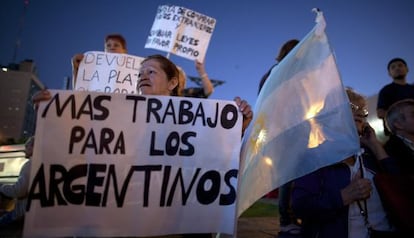Inflation once again an everyday battle for millions of Argentineans
Government has refused unions’ request for wage rise to mitigate high prices


Inflation is once again the main topic in Argentinean politics. It has been just six months since labor unions signed the latest round of wage agreements, which on average increased by 29.7 percent. But several unions, including some that have ties to the government, say inflation has “shredded” and “smashed” those increases. Unions and private consulting firms report an estimated annual inflation rate of 40 percent but cabinet chief Jorge Capitanich said the numbers were “a sketch,” “a mess.” Purchasing power has not decreased and salaries are still above inflation rates, he said. Unions asked for December bonus payments to make up for losses, but the government flatly rejected the proposal. “We do not promote or sponsor and we will not sponsor any exceptional measure,” Capitanich said on Wednesday.
This is a sensitive issue given that December is usually the most problematic month in Argentina, coinciding with Christmas shopping and coming just before the summer vacation period in the Southern Hemisphere. It is the month during which rioters have raided shops and supermarkets, leading to a dozen deaths in 2012 and several other casualties in 2013. Perhaps in order to avoid unrest, San Luis’ governor has announced a 2,000-peso bonus (€184) for government employees. La Rioja’s governor is also offering 300 to 400 pesos (€27 to €36) in extra pay.
Every Argentinean is dealing with inflation as best they can. Those who earn more sign up for “all-inclusive” trips abroad that cover flights, hotels and all food. This way they make sure that any devaluation in the peso or any increase in prices will not affect them.
Others do what one Buenos Aires taxi driver who prefers to remain anonymous said: “I get paid and I buy dollars. I get paid and I buy dollars. I get paid and I buy ... My wife and I work on the Ministry of Security’s administrative staff. We live on what I make with the taxi. And we invest our salaries in dollars. That way we save, we make sure inflation does not it eat into it. Ten years ago a trip to the Caribbean cost $1,500 – same as today. But it’s much more in pesos. Then they might tell you that you don’t believe in the country, that you have to spend pesos, but the peso is not worth anything after a few months.”
Alejandro who owns a travel agency with his father, Enrique, says Argentineans are experts at dealing with inflation. Both men say that in the 1980s businesses would end up changing their prices every hour or even close for weeks and months because they could not restock their merchandise, no matter how much they raised prices. “It’s true that now people buy trips months ahead and they buy dollars,” Alejandro says. “But only those who have the money do so. Meaning a small minority. The problem is those who don’t have it.”
I get paid and I buy dollars. I get paid and I buy dollars. I get paid and I buy…”
Buenos Aires taxi driver
And what do the ones who don’t have it do? “This is a hustling country,” Enrique says. “Everyone hustles however they can.”
“We change our habits,” one customer says. “If you used to eat grilled meat every week, now you eat it less. If you used to come downtown by car, now you come on the bus.”
More and more people are now driving to Mercado Central, the wholesale market about an hour outside downtown Buenos Aires. There they can buy food at lower prices than those found in the supermarkets. Mabel, who is employed as a domestic worker in Buenos Aires, shares her coping methods: “My husband went recently with two other families and they bought a 30-kilo sack of potatoes for 48 pesos (€4.40) when just one kilo can cost 15 pesos (€1.80) in the city. Potatoes keep well and 10 kilos can last you more than 20 days at home.”
The government has already told unions that there will not be any bonus pay. Union leaders must decide what measures to take between now and December.
Translation: Dyane Jean François
Tu suscripción se está usando en otro dispositivo
¿Quieres añadir otro usuario a tu suscripción?
Si continúas leyendo en este dispositivo, no se podrá leer en el otro.
FlechaTu suscripción se está usando en otro dispositivo y solo puedes acceder a EL PAÍS desde un dispositivo a la vez.
Si quieres compartir tu cuenta, cambia tu suscripción a la modalidad Premium, así podrás añadir otro usuario. Cada uno accederá con su propia cuenta de email, lo que os permitirá personalizar vuestra experiencia en EL PAÍS.
¿Tienes una suscripción de empresa? Accede aquí para contratar más cuentas.
En el caso de no saber quién está usando tu cuenta, te recomendamos cambiar tu contraseña aquí.
Si decides continuar compartiendo tu cuenta, este mensaje se mostrará en tu dispositivo y en el de la otra persona que está usando tu cuenta de forma indefinida, afectando a tu experiencia de lectura. Puedes consultar aquí los términos y condiciones de la suscripción digital.








































